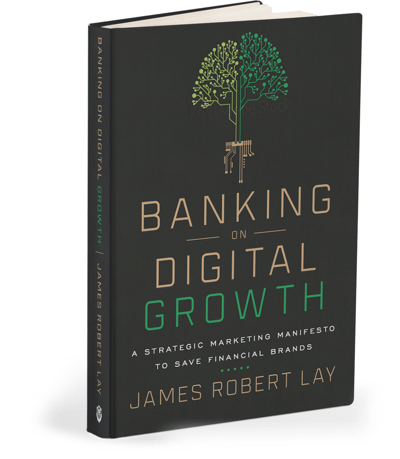"Money has no value without the activities of life." -Allison Netzer
A financial partnership shouldn't be taken lightly. If you enter into a new partnership at a point of crisis when you can’t give it your full attention, you’re doing it a disservice.
James Robert Lay spoke with two of the financial world’s top experts in financial partnerships to discuss the pitfalls of partnerships and how to nourish positive connections.
Margaret Hardigan is the founder and CEO of Marstone, which is on a mission to enhance financial literacy, deepen financial inclusion, and humanize finance for all. Allison Netzer is the chief marketing and strategy officer at Nymbus, which empowers financial brands to transform their capabilities and maximize growth in today's digital marketplace.
Flashback to the Great Recession
Think back to 2008, during the infamous great recession in the financial marketplace. How did this rocky period influence wealth managers and teach them about partnerships and people?
Margaret was working in a client-facing job where every interaction involved a personal narrative. She was building trusts, college accounts, and mortgages for people who were planning for challenging times.
Most people lacked financial literacy and didn’t understand the language of investments. There were also concerns that the tax code might change under President Obama and generations of people were wondering what that meant for them.
Plus, the institution itself was operating in silos that didn’t spend much time speaking to each other. The organization was having a hard time adapting to new technology.
This is an instructive situation because many financial institutions are still struggling with all these same problems today as they were back in 2008. There are people problems, technology problems, and money problems. There’s still an emotive side of managing money that’s always been hard to understand and act upon.
Emotions, Money, and Financial Brands
Money is deeply connected to the emotions people feel.
A recent survey found 3 in 4 Americans feel anxious about their financial situations and 58% feel finances control their lives. About half of all Americans have difficulty controlling their money-related worries, which seep into their minds all day long.
Think about how this causes anxiety in our everyday lives. For example, newlyweds rate future financial security as their number one concern. The same goes for new business owners. They have fear and anxiety about their futures and livelihoods, and their banks should care about that.
Margaret also sees this in wealth management. Banks and credit unions have a huge opportunity to offer wealth management and help struggling people find financial options. When a small business owner has a liquidity event or when someone receives an inheritance, they need help. In fact, they might leave your institution in search of other options if you don’t help.
Firms like Nymbus and De Novo Banks can step in to help and offer additional services. This means you could increase your net promoter score and average number of services significantly. You might be surprised by how accessible the cost structure is to make it happen.
Lead gen companies like NerdWallet are also offering options to bring new services and find new growth opportunities. Financial companies can look for partnerships like these to create value and humanize finance for people.
Myths and Misconceptions of Financial Brand Collaborations
The average person might not realize that wealth management isn’t just for rich people.
It’s for everyone.
It’s about creating your legacy and building wealth for the future, but it’s also about ordinary things. This is the democratization of financial literacy: empowering people with knowledge and education.
There are also misconceptions within the financial brands themselves that hold them back from moving forward.
For example, they might view their entire industry as one of competition and survival rather than one of collaboration as equals.
Moving past these misconceptions is vitally important. Collaborations can yield the most important and lucrative connections of the future. Plus, collaborations don’t have to be on paper. They can be informal connections that foster ideas and help people think in new directions.
Margaret also points out that for customers, financial literacy shouldn’t be thick with math and jargon. It should come with simple platforms that clarify their finances. It can use a gamified platform or something that gives people a positive feeling about success.
In plain language, financial customers shouldn’t have to be financial masterminds. They’re ordinary people who want to buy a house, send their kids to school, and succeed in the world. They have ever-changing finances and timelines, and they need to be empowered to take action on a million small financial decisions.
Innovation Partnerships
Margaret recommends that banks take an inventory of the current client base on things like age concentration and look at opportunities they’re missing.
Is there a way to connect with younger clients?
Look at a company like Robinhood. Margaret attended a conference where people may have been scoffing at Robinhood’s success, but they learned that Robinhood’s average account size of about $3,000 was pretty close to where Schwab stood in 1985.
Companies like Robinhood and Coinbase are doing things other banks can’t do right now, like same-day settlement and pre-funding. With Nymbus, a bank can be agile and do R&D that helps them test and learn. That’s a huge advantage.
Research has shown that most financial customers aren’t looking for a complete revolution with big overhauls in their banking. They’re looking for incremental changes that make their experience more helpful and meaningful.
This is an opportunity for financial brands to make small changes that would make a big difference to their customers. Now’s the time to seek innovative new partnerships that truly deliver on the enduring promise of great customer service.
This article was originally published on January 19, 2022. All content © 2024 by Digital Growth Institute and may not be reproduced by any means without permission.





